Trong ngữ pháp tiếng Anh, bên cạnh những động từ thường, động từ to be thì động từ khuyết thiếu (Modal Verbs) cũng được đánh giá là chủ điểm ngữ pháp quan trọng, hay được sử dụng. Vậy động từ khuyết thiếu trong tiếng Anh là gì? Làm thế nào để sử dụng đúng động từ khuyết thiếu? Hãy để duhoctms.edu.vn giải đáp cho bạn nhé!
Nội dung chính:
1. Động từ khuyết thiếu (modal verbs) là gì?
Động từ khuyết thiếu là các động từ có chức năng bổ nghĩa cho động từ chính. Được sử dụng để diễn tả khả năng, dự định, sự cấm đoán, cần thiết,… Những động từ khuyết thiếu phổ biến trong tiếng Anh bao gồm: can, could, may might, must, have to, need, should, ought to,…
Trong câu, động từ khuyết thiếu (modal verbs) có vị trí theo cấu trúc như sau:
| (+) S + modal verb + V (nguyên thể) |
| (-) S + modal verb + not + V (nguyên thể) |
| (?) Modal verb + S + V (nguyên thể)? |
Ví dụ:
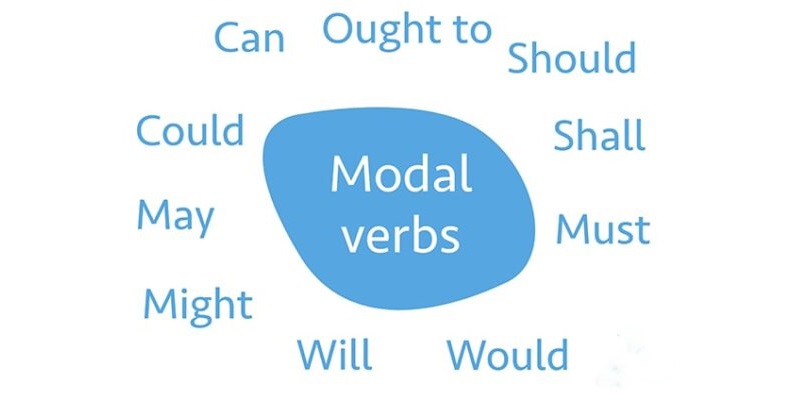
- They can speak Vietnamese fluently.
Họ có thể nói Tiếng Việt trôi chảy.
- You mustn’t park here.
Cấm đậu xe ở đây.
- May I go out?
Xin phép, tôi có thể ra ngoài không?
2. Modal verb thông dụng và phân loại modal verbs
Có 5 loại modal verbs chính mà duhoctms.edu.vn đã phân tích và tổng hợp một cách ngắn gọn nhất như dưới đây:
| Ability | can, could, be able to |
| Permission | can, could, may, be allowed to |
| Obligation and Necessity | Must, have to, have got to, need to |
| Advice | should, ought to, had better |
| Possibility | might, may, could, can |
2.1. Ability: Can, could, be able to
Chúng ta sử dụng “can” để nói ai đó có kĩ năng, khả năng làm việc gì đó.
Example:
We can see the beach from our house.
The word “dance” can be a noun or a verbs
Thể phủ định: can’t= cannot
- Be able to: chúng ta sử dụng để nói về ai đó có khả năng làm gì, tuy nhiên “can” được dùng phổ biến hơn cả.
Example: We are able to see the beach from our house.
- Could là thể quá khứ của “can”, chúng ta sử dụng “could” đặc biệt với: see, hear, smell, taste, feel, remember, understand.
Example: I could smell gas when I walk into the room
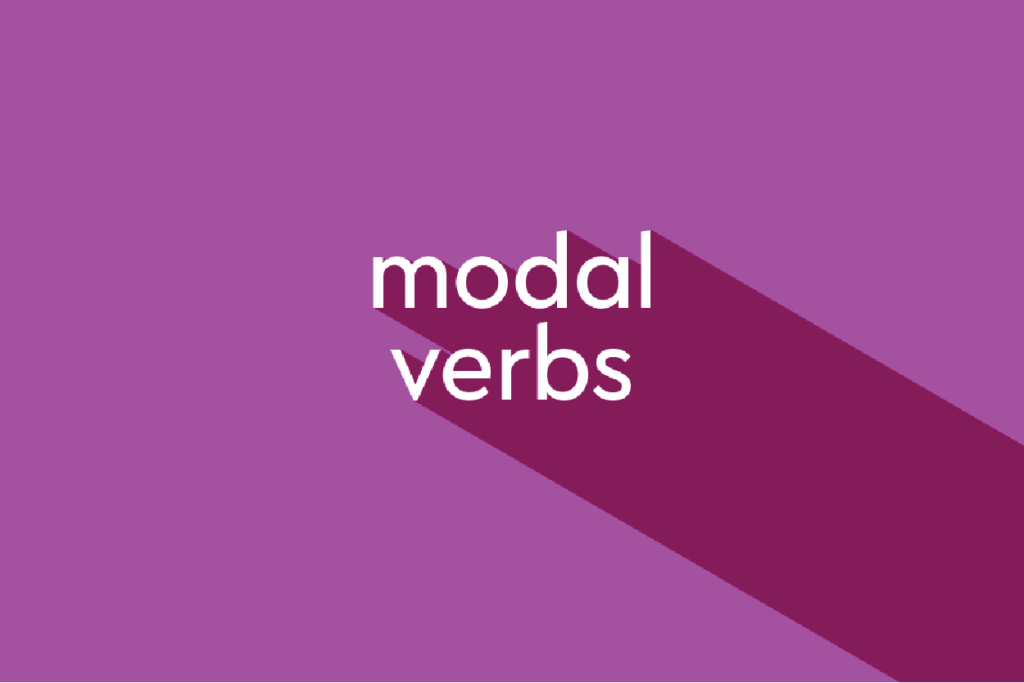
Chúng ta sử dụng could để nói rằng ai đó đã có khả năng, kĩ năng làm việc gì đó trong quá khứ.
Example:
My uncle could speak 4 languages.
We were free. We could do what we wanted.
2.2. Permission: can, could, may, be allowed to
- May là cách nói lịch sự để hỏi sự cho phép của ai đó.
Example:
You may go as soon as you have finished your work.
May I go to the restroom, Mr. Crowd?
- Could được dùng để hỏi sự cho phép, thường không lịch sự bằng “may”, could thường hỏi sự cho phép trong quá khứ.
Example:
Could I bring my brother to the party?
You could go to any shop in the mall you wanted to.
- Can sử dụng để hỏi sự cho phép, nhưng ít trang trọng và lịch sự hơn. Thông thường dùng trong các mối quan hệ thân thiết hơn.
Example:
Can I borrow your book?
You can sit here until he come.
- Be allowed to được dùng nhằm diễn tả sự cho phép, nhưng không phải là bạn đang yêu cầu, mà thông thường dùng ở bị động “be allowed to/ not be allowed to” có nghĩa là được phép hoặc không được phép làm gì.
Example: I are not allowed to use your calculator on your maths exam.
You were allowed backstage after my third attempt.
2.3. Obligation and Necessity: Must, have to, have got to, need to
- Have to: cần thiết để làm điều gì, bị buộc phải làm điều gì đó (giống như luật lệ).
Example: You can’t turn right here. You have to turn left.
Chúng ta có thể nói “ I’ll have to……., I’m going to have to…….., I might have to………, I may have to……”
Example: We may have to change the plans.
- Must và have to có thể thay thế cho nhau trong một số trường hợp, ví dụ như khi các bạn đưa ra quan điểm cá nhân (đề xuất những điều cần thiết để làm điều gì đó).
Example: He is a really nice person. I must meet him/ I have to phone him.
- Tuy nhiên, have to dùng cho ai đó bị bắt buộc làm những điều có thực ( như luật lệ, quy định), chứ không phải quan điểm của người nói.
Example:
I have to work from 8.30 to 6.00 everyday.
Steve has to travel a lot for her work.
- Chúng ta sử dụng must trong các văn bản hướng dẫn, điều lệ.
Example: Applications for the job must have 2 foreign languages.
- Need to thường dùng để diễn tả sự cần thiết cần hoặc không cần làm gì, bạn có sự lựa chọn và không bị ép buộc như must và have to.
Example: They has to work overtime >< They>
3. Chức năng của các Modal Verb
3.1. Must
Diễn tả sự bắt buộc ở hiện tại hoặc tương lai.
Ví dụ: You must go to bed at 11.30 pm everyday.
Lưu ý: Mustn’t- sự cấm đoán, không được làm gì đó.
- Example: You mustn’t smoke at the hospital.Phủ định của “must” là “had to”.
- Example: They had to do this task yesterday because of running out of time.
3.2. Can và Could
Can
- Lời đoán hoặc sự chắc chắn về điều gì đó có căn cứ.
Ví dụ: He must be very tired after working hard all day long.
- Diễn tả khả năng hiện tại hoặc tương lai mà ai đó có thể làm được, hoặc sự việc nào đó có thể xảy ra.
Ví dụ: I can speaking English fluently.It can rain today.
- Yêu cầu sự cho phép
Ví dụ: Can I use your computer?
- Diễn tả khả năng
Ví dụ: Smoking can cause lung cancer.
Could
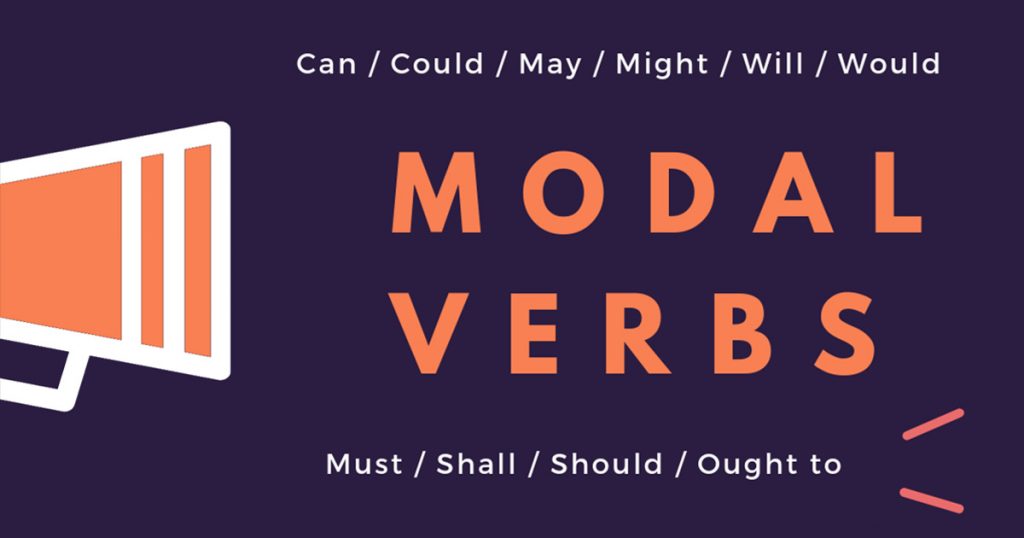
- Diễn tả khả năng trong quá khứ
Ví dụ: I could read when I was six years old.
- Sự xin phép một cách lịch sự
Ví dụ: Excuse me, Could I use your phone?
- Diễn tả khả năng
Ví dụ: It could rain tomorrow!
Lưu ý
“Can” và “could” thường có cùng chức năng: diễn tả khả năng của ai đó hoặc cái gì có thể xảy ra, sự cho phép. Tuy nhiên sắc thái khác nhau. “Can” dùng hiện tại, “could” dùng quá khứ và có phần lịch sự hơn.
Example: Can I borrow your book?Could I borrow your book?
3.3. May và might
May
- Sự cho phép
Ví dụ: May I use your phone please?
- Khả năng, xác suất
Ví dụ: It may rain tomorrow!
Might
- Hỏi sự cho phép một cách lịch sự.
Might I interrupt for a moment?
- Khả năng, xác suất
The car looks nice but it might be expensive.
Lưu ý
- “May” và “might” dùng để xin phép, tuy nhiên “might” hầu như chỉ dùng trong câu gián tiếp và ít dùng trong văn nói.
Example: He asked if she might come later.
- “May” và “might” đều nói về khả năng nhưng mức độ xảy ra thấp khi dùng “might”, còn mức độ xảy ra cao hơn khi dùng “may”.
Example: I may join you tomorrow.I might join you tomorrow.
- Với quá khứ, chúng ta sử dụng may have/ might have
Example: I wonder why kate didn’t answer her phone? She may have been asleep. I can find my jey anywhere. – You might have left it at work.
3.4. Need not
Không cần thiết, không bắt buộc phải làm gì đó.
Ví dụ: I needn’t come with us.
Lưu ý: Có thể sử dụng “don’t/ doesn’t need to…”We don’t need to hurry.
3.5. Should/ought to
- 50 % sự ép buộc
Ví dụ: You should/ ought to see a doctor.
- Lời khuyên
Ví dụ: You should/ ought to revise your lessons at home.
- Kết luận có căn cứ
Ví dụ: He should/ ought to be very tired. He’s been working all day long.
Lưu ý: Should/ ought to cũng được dùng khi diễn tả điều gì đó không đúng nếu không xảy ra.
Example: Where’s Jane?- She should be here right now.
3.6. Had better
Chức năng: Lời khuyên (tốt hơn hết là …)
Ví dụ: You’d better do the homework right now.
3.7. Have to
Chức năng: Bắt buộc phải làm gì đó vì sự cần thiết
Ví dụ: You have to sign your name here.
Lưu ý: Mức độ bắt buộc của “have to” không cao bằng “must”.Phủ định của have to là “don’t/ doesn’t have to”.
3.8. Will/ Would
Will: Đoán sự việc có thể xảy ra trong tương lai
Ví dụ: It will be rainy tomorrow
Would: Diễn tả giả định xảy ra, dự đoán sự việc xảy ra trong quá khứ
Ví dụ: He would be exhausted when hear this bad news.
Lưu ý:
Will và would có thể dùng trong câu đề nghị, yêu cầu, lời mời.
Example: Will you give me your address?Would you like some coffee?
3.9. Shall
Đề xuất làm gì với ngôi “I”, “we” hoặc giao nhiệm vụ cho người khác một cách trang trọng
Ví dụ: What shall we meet?We shall commit doing the articles in the agreement
4. Cách sử dụng Modal Verb – Động từ khiếm khuyết phổ biến trong IELTS task 2
Ba chức năng quan trọng của động từ khiếm khuyết khi bạn viết hay nói IELTS là:
- Thảo luận về mức độ chắc chắn
- Gợi ý
- Những trường hợp giả định
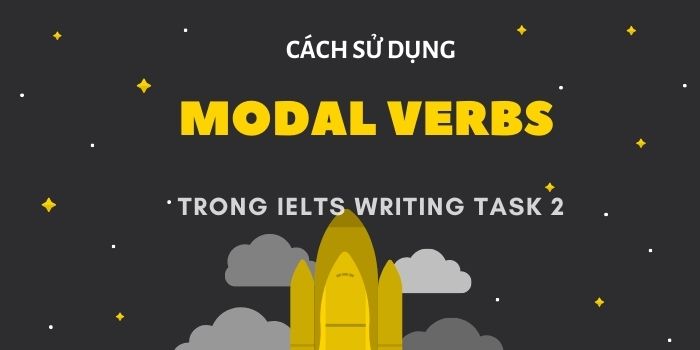
4.1. Sử dụng Modal Verb – Động Từ Khiếm Khuyết thể hiện mức độ chắc chắn
Các Động Từ Khiếm Khuyết như “Will, may, might và could” thường diễn giải logic về một tình huống hoặc tương lai mà bạn cần làm trong task 2:
Children with no father as a role model will become criminals. (100%)
Children with no father as a role model may become criminals. (Possible)
Children with no father as a role model could become criminals. (Possible)
Những câu nào bạn nghĩ chưa chính xác?
Hi vọng bạn tìm ra là câu đầu tiên sai. Đây là lỗi sai phổ biến trong những bài luận IELTS.
Chính xác về mặt ngữ pháp nhưng không thể kết luận tất cả trẻ em không có một người bố gương mẫu thì đều trở thành tội phạm.
Hãy thận trọng trong việc sử dụng Động Từ Khiếm Khuyết WILL khi bạn đánh giá theo cách này.
“Will” là chắc chắn 100% sẽ xảy ra, vì vậy tránh sử dụng nó để khái quát về mọi người/ mọi vật trừ khi bạn biết 100% điều đó đúng. (Có nhiều cách khác để giảm bớt độ chắc chắn, ví dụ “will possibly”)
When you are writing IELTS essays, it’s unusual that you will have evidence with you or that you can use to show 100% what you are saying is true.
Khi bạn viết bài luận IELTS, việc bạn có bằng chứng hay bạn có thể sử dụng để chứng minh 100% điều bạn đang nói đúng là rất hiếm.
Vì vậy, hai câu sau trong ví dụ trên sẽ tốt hơn trong trường hợp này.
4.2. Lời gợi ý có sử dụng động từ khiếm khuyết
“must, should, ought to, have to và could” thường được sử dụng để gợi ý trong việc giải quyết vấn đề. Thảo luận về một vấn đề và gợi ý cách giải quyết được hỏi trong task 2 là phổ biến.
Governments must/have to/need to take action to tackle global warming. (strong obligation)
Parents should/ought to stop their children watching too much television. (Strong suggestion)
Individuals could recycle more (possibility).
Hãy nhìn vào model essay on global warming này và chú ý cách sử dụng động từ khiếm khuyết trong đoạn văn thân bài thứ 2 để thảo luận những cách giải quyết.
4.3. Những tình huống giả định sử dụng modal verb
Thông thường sử dụng các động từ khuyết thiếu như “would” và “could” để thảo luận về các tình huống giả định.
Nếu giả định một điều gì đó, có nghĩa là nó không gây ra ảnh hưởng. Bạn đang thảo luận một tình huống không thực tế trong tương lai hoặc đang tưởng tượng một điều gì đó.
Ví dụ: If the government spent more money on hospitals, people would be healthier.
5. Bài tập thực hành Modal Verbs
5.1. Phần bài tập
Bài 1: Điền trợ động từ thích hợp vào chỗ trống
Can – may – must – should – ought to – might – will – couldn’t
- You ……………………… tell me the truth for your own good.
- I ……………………… find my shoes anywhere.
- We ……………………… arrive on time or else we will be in trouble.
- He ……………………… shoot the basketball at the rim.
- ……………………… you let me know the time?
- They ……………………… not be trustworthy enough.
- …………………….. you please pass the salt?
- We ……………………… prepare for the big exam.
Bài 2: Chọn từ thích hợp
- You must/ should/ shouldn’t be 18 before you can drive in Spain
- You don’t have to/ mustn’t/ shouldn’t go to bed so late. It’s not good for you.
- You don’t have to/ mustn’t/ shouldn’t wear a school uniform in most Spanish state schools.
- You must/ mustn’t/ needn’t come. I can do it without you.
- You don’t have to/ must/ mustn’t copy during exams.
- You don’t have to/ mustn’t/ shouldn’t be very tall to play football.
- You must/ mustn’t/ needn’t be a good writer to win the Pulitzer Prize.
Bài 3: Viết lại các câu sau đây sao cho nghĩa không đổi

- Perhaps Susan knows the address. (may)
→ Susan______________________________________________
- It’s possible that Joanna didn’t receive my message. (might)
→ Joanna ______________________________________________
- The report must be on my desk tomorrow. (has)
→ The report ______________________________________________
- I managed to finish all my work. (able)
→ I______________________________________________
- It was not necessary for Nancy to clean the flat. (didn’t)
→ Nancy______________________________________________
Bài 4: Chọn đáp án đúng
Question 1: Ted’s flight from Amsterdam took more than 11 hours. He ________be exhausted after such a long flight.
A. Had better
B. Can
C. Must
Question 2: The book is optional. My professor said we could read it if we needed extra credit. But we _________read it if we don’t want to.
A. Don’t have to
B. Can not
C. Must not
Question 3: Susan _________hear the speaker because the crowd was cheering so loudly.
A. Can’t
B. Couldn’t
C. Might not
Question 4: The television isn’t working. It _________damaged during the move.
A. Must
B. Must be
C. Must have been
Question 5: Kate: _________hold your breath for more than a minute?
Jack: No, I can’t
A. Can you
B. Are you able to
C. Might you
Question 6: You __________be rich to be success. Some of the most successful people I know haven’t got a penny to their name.
A. Can’t
B. Shouldn’t
C. Don’t have to
Question 7: You __________worry so much. It doesn’t do you any good. Either you get the job, or you don’t. If you don’t, just apply for another one. Eventually, you will find work.
A. Don’t have to
B. Shouldn’t
C. Can’t
Bài 5: Complete the sentences with can, could, may, might, should or must in the positive or negative.
1. Richard’s only three but he ..can.., swim very well.
2. You’ve had that headache for two days, I think you ………. go to the doctor.
3. I don’t think we ………. go to the beach because it ………. rain this afternoon.
4. I lived in Germany as a child so I ………. speak German then but I ………. speak it now.
5. You ………. remember to take your passport tomorrow.
6. ………. you close the door, please?
7. We………. move house next year but we’re not sure yet.
8. Passengers ………. smoke when the plane is taking off.
9. I think you ………. play tennis with Sally – she ………. play really well.
10. ” Do you think I ………. learn some Portuguese before I go to Brazil?”
” Yes, that would be a good idea.”
11. We ……… remember to pay this bill before the weekend – it’s very important. If we don’t, we’ll have no electricity.
12. I know you like sugar but you ………. eat quite so much – it’s bad for you.
13. I’ll be at work on Saturday so I’m afraid I ………. come to the football match you.
14. I was listening very carefully but I ………. hear what she said.
15. They don’t like living in the countryside – it’s too quiet. I think they ………. move back to the city but they don’t agree.
Bài 6
- I haven’t been……………… sleep very well recently. (could/ able to/ can)
- I ………….. swim to safety (can/ could/ was able to)
- I ……………. get you a chips when I go to the shop, if you want. (can/ could/ able to)
- Dennis ……….play the trumpet after weeks last month. (can/ could/ was able to)
- After his car crashes he was so confused that he …………… tell the police who he was or where he was going. (can/ can’t/ could/ couldn’t)
Bài 7: Choose the best answer
- …………. I have more cheese on my sandwich? (medium formal)
- …………. she have a cookies? (casual)
- ………….. I go to the washroom? (most polite)
- hey buddy, I can’t get a connection on my phone. ……………. I borrow yours? (can/ could/ may)
- There’s a lot of noise coming from outside, we could not focus on presentation. ………………… I close the window? (can/ could/ may)
Bài 8: Viết lại câu với modal verbs
- I’m feeling sick. I ate too much…………………………………………………………………………………………
- When we went to the restaurant, there were no free tables. We hadn’t reserved one……………………………………………………………………………………………………………………
- Laura told me her address, but I didn’t write it down. Now I can’t remember the house number……………………………………………………………………………………………………………………
- I wasn’t feeling well yesterday, but I went to work. That was a mistake. Now I feel worse……………………………………………………………………………………………………………………
- Tomorrow there is a football match between Team A and team B. team A are much better…………………………………………………………………………………………………………………..
Bài 9: Fill in the blanks using MUST, MUSTN’T, DON’T HAVE TO, SHOULD, SHOULDN’T, MIGHT, CAN, CAN’T !
- Rose and Ted _____ be good players. They have won hundreds of cups !
- You _____ pay to use the library. It’s free.
- I’m not sure where my wife is at the moment. She _____ be at her dance class.
- Jerry _____ be working today. He never works on Sundays.
- You _____ be 18 to see that film.
- You _____ hear this story. It’s very funny.
- Dad _____ go and see a doctor. His cough is getting worse all the time.
- You don’t have to shout. I _____ hear you very well.
- It _____ be him. I saw him a week ago, and he didn’t look like that. 10. You look pretty tired. I think you _____ go to bed early tonight.
Bài tập 10: Chia động từ trong ngoặc đơn
- You (should visit)____ your grandparents often.
- Mark always (will, be)____ late!
- (Would, like) ____you ____ some beer?
- She (must come not) ____ back home after 10 p.m.
- Learning Vietnamese (may, be) ____ hard for somebody.
Đáp án bài tập Modal Verbs
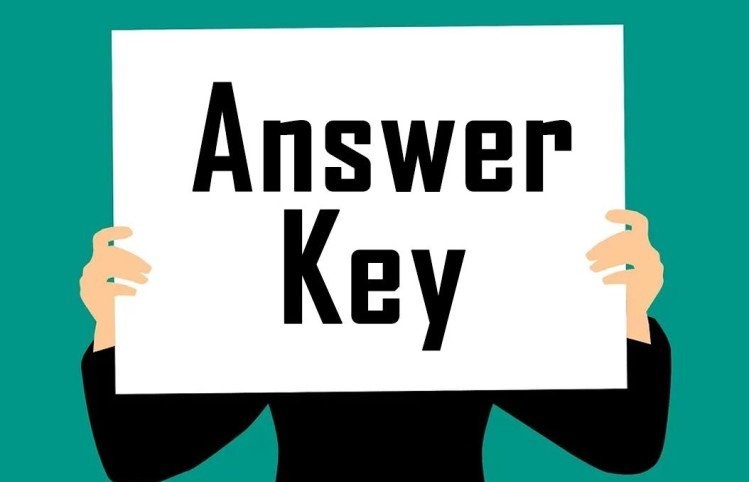
Bài 1
| 1. should | 2. couldn’t | 3. ought to | 4. can |
| 5. May | 6. might | 7. Will | 8. must |
Bài 2
| 1. must | 2. shouldn’t | 3. don’t have to | 4. needn’t |
| 5. mustn’t | 6. don’t have to | 7. must |
Bài 3
| Exercise 3 |
| 1. Susan may know the address. |
| 2. Joanna mightn’t have received my message. |
| 3. The report has to be on my desk tomorrow. |
| 4. I was able to finish all my work. |
| 5. Nancy didn’t need to clean the flat |
Bài 4
| 1. C | 2. A | 3. B | 4. C | 5. A | 6. C | 7. B |
Bài 5
| 1. can | 2. should | 3. should … might/may | 4. could … can’t | 5. must |
| 6. Can/Could | 7. may/ might | 8. must not | 9. should …. can | 10. should |
| 11. must | 12. shouldn’t | 13. can’t | 14. couldn’t | 15. should |
Bài 6
1. Able to 2. Was able to 3. Can 4. Could 5. Couldn’t
Bài 7
- Could 2. Can 3. May 4. Can 5. May
Bài 8
- You should eat too much
- We should have reserved before
- I should have written down her address.
- I shouldn’t have gone to work.
- Team A should win the match.
Bài 9
- must
- don’t have to
- might
- can’t
- must
- must
- should
- can
- can’t
- should
Bài 10
- You should visit your grandparents often. (Bạn nên đến thăm ông bà thường xuyên)
- Mark always will be late! (Mark luôn muộn giờ!)
- Would you like some beer? (Bạn có muốn uống một chút bia không?)
- She must not come back home after 10 p.m. (Cô ấy không phải về nhà trước 10 giờ tốt.)
- Learning Vietnamese may be hard for somebody. (Học tiếng Việt có lẽ khó với một số người.)
Bài viết trên duhoctms.edu.vn đã tổng hợp kiến thức và bài tập áp dụng về Modal verb – Động từ khuyết thiếu. Duhoctms.edu.vn hy vọng rằng thông qua bài viết trên, các bạn sẽ có thể nắm vững và sử dụng thành thạo các động từ này. Chúc các bạn học tập tốt.


Bình luận